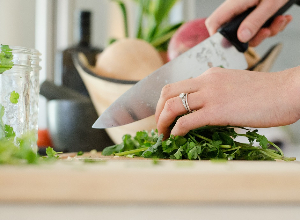Cancer and food: advice from a dietician (1/2)
Published 12 Jul 2019 • Updated 23 Jul 2019 • By Louise Bollecker
Read our interview with Elisa Cloteau, dietician and nutritionist at Espace Mieux Manger in Pornichet, France, to better understand the interactions between cancer and food.

Hello Elisa, is it possible to prevent cancer with a certain diet?
Although people who eat poorly often develop cancer, cancer can affect both people who eat very healthy food and those who consume mainly junk food. In addition to diet, many other factors play a role in the development of cancer, such as the ability to cope with stress, lifestyle (sleep, smoking, alcohol, pollution...) and genetic predisposition.
Nevertheless, it is important to have a balanced diet and to eat as little processed food as possible. Overweight and obesity are also risk factors, particularly for pancreatic cancer, post-menopausal breast cancer and esophageal cancer.
Are there any foods that directly promote the development of cancer?
I think it is clear that alcohol consumption is involved in the development of cancer, but repeating it can't hurt.
According to the WHO, there is a link between intestinal cancer and meat consumption. Several studies also suggest that there may be a link between the development of prostate and pancreatic cancer and meat consumption.
>> Read our article about alcohol consumption
The consumption of sugar and dairy products also plays a role in the development of cancer. Excessive consumption of animal fat is associated with colon cancer and rectal cancer. Salt and salt-rich foods are likely to be involved in the development of stomach cancer. The risk of developing lung cancer increases, especially among smokers and people exposed to asbestos, with the consumption of dietary supplements rich in beta-carotene. The same is true for stomach cancer.
What does this mean for us?
On the one hand, we should only eat a small amount of fat and/or red meat. We should also eat processed meat and sauces in moderation. In October 2015, IARC (International Agency for Research on Cancer) classified the consumption of meat products as carcinogenic and the consumption of red meat as a possible carcinogen.
Salt, fried products, sausages, smoked fish and canned foods should be consumed with caution.
Taking beta-carotene-based dietary supplements to prevent cancer makes no sense. Quite the contrary! For smokers, these dietary supplements are even associated with a risk of cancer. Food supplements should only be taken on the advice of a doctor or pharmacist.
What is the best diet?
Our diet must be healthy and balanced, with enough fruit and vegetables. A 13-year Swiss study of more than 70,000 people clearly showed that it is possible to increase life expectancy by eating five servings of vegetables and fruit per day. It should be noted that food supplements cannot replace a healthy diet.
>> The gluten-free, sugar-free and lactose-free diet as told by a Carenity member
Ideally, I recommend eating one serving of raw food per meal. It can be a salad for starters, fruit, a fruit salad or a juice. But even this recommendation cannot apply to everyone.
What are the alternatives to raw fruits and vegetables?
As a preface, it should be kept in mind that it is essential to adapt the amount and type of preparation to the individual. Some people suffer from constipation, while others suffer from diarrhea or irritable bowel syndrome.
Steam cooking
Steam preserves water-soluble minerals. Steaming is therefore a good cooking method for vegetables and fruit.
Cooking with water
When making soups, you can cook vegetables in water. For the sick, it is advisable to drink only vegetable broth, which is low in fibre and rich in minerals. The vitamins also remain well preserved in the wok.
The grills
Grease that drips into embers during a barbecue produces substances that are harmful to health. If you take certain precautions and use grill plates, vertical grills, plancha grills, etc., you can still grill from time to time.
Any last words of advice to end this first interview?
What you must absolutely avoid is eating the same foods over and over again. Particularly sick people with little appetite appreciate it when preparation methods change and meals are well presented.
Thank you very much to Elisa for answering our questions. You will find more information in our second interview. And what kind of diet do you have?

 Facebook
Facebook Twitter
Twitter






